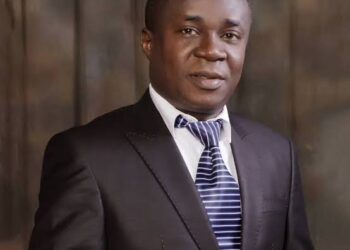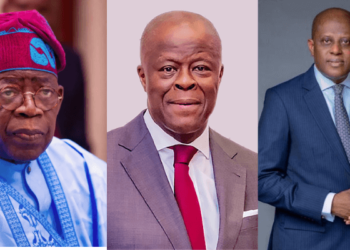By: John Danjuma Omachonu
Nigeria’s fiscal and monetary policies may be heading for cross purposes as economic planners and managers confront prospects of four year rise in the prices of consumer goods, ocassioned by rising insecurity and high level politicking, capable of derailing the administration from its stated objectives of lifting greater number of citizens out of poverty as well as improving lives and livelihoods of the citizens, information From The Street, (FTS) has shown
FTS perspectives observed that, politicians are currently preoccupied witg politics of survival, propaganda, petty politicking and party power games that have continued to make the economy vulnerable, with the attendant heightened political and social risks.
To kick start economic recovery and growth, the Bola Tinubu administration, at inception, two years ago, came out with pragmatic key economic policy measures, including subsidy removal and unification of exchange rates aimed at economic recovery and growth.
There was also the introduction of a
new tax bill to simplify the tax system, broaden the tax base, and reduce tax burdens on low-income earners, among others.
While subsidy removal was designed to reduce the financial burden on the government and promote economic efficiency, though with the attendant hardship in increased fuel prices, rates unification was for attracting foreign investment and stabilise the naira, the tax reform bill was to increase government revenue while promoting economic growth
As the administration was working to ameliorate the attendant negative consequences of increases in fuel pump prices and a sharp depreciation of the currency, which has made imports more expensive and exacerbating inflation, the administration seems distracted by other extraneous factors.
While these policies have shown some positive results, such as the rise in the nation’s Gross Domestic Products (GDP), impressive accretion to the foreign reserves, challenges of rising insecurity, inflation, currency fluctuations and economic instability persist.
According to some analysts, the accrued savings from the subsidy removal, for instance, is considered mostly enjoyed by the states, whose Governors have been receiving, monthly, at least in the last two years, billions of naira from the FAAC allocations, but in most cases, evidences, in form of capital projects, are non existence.
Also, perceived high cost of governance and the seemingly ‘flamboyant’ life styles of some appointed and elected government officials are at variance with the preachings of austerity in some quarters.
More worrisome, according to the analysts, is the fact that two years to the end of the administration’s four year term, politics seems to have taking the front burner at the expense of the economy.
With the rising insecurity, they further argue, farm produce would further reduce, fueling inflationary pressures with the attendant divergence in policy.
The analysts were unanimous in their submissions that the ensuing divide between the country’s fiscal and monetary policy, ocassioned by high cash liquidity from elections and by-elections as well as monthly largesse, inflation would further spike.
For instance, amid excess liquidity in the financial sector, banks’ borrowing from the Central Bank of Nigeria (CBN) dropped by 28.2 per cent Year-on-Year (YoY) to N2.9 trillion in August 2025 from the N4.04 trillion recorded in August 2024.
The sustained increases from FAAC disbursements to the federal, states, and local governments, and broad money supply (M2), were some of the factors that contributed to excess liquidity in the financial sector.
Banks access credit from the apex bank using the Standing Lending Facility (SLF) window and deposit excess cash using the Standing Deposit Facility window (SDF).
The CBN lends money to banks and merchant banks through the SLF at an interest rate of 500 basis points (bpts) above the Monetary Policy Rate (MPR).
Similarly, the apex bank accepts deposits from the banks through its SDF, and pays an interest rate of MPR minus 100 basis points.
According to the apex bank’s financial data, between January-August 2025, the banks accessed an estimated N68.43 trillion, representing a decline of 13.6 per cent from the N79.22 trillion they accessed between January-August 2024.
Data from the money and credit statistics of the CBN showed that the country’s M2 surged by 15.8 per cent year-on-year to N117.5trillion as of June 2025, as against N101.45 trillion in June 2024.
M2 includes cash, demand deposits, savings deposits, money market deposits, and time deposits, and these provide a comprehensive measure of liquidity in the economy.
While the rising liquidity, the analysts say, is naturally expected to support economic activities, through credit facilities to the real sector, reverse is the case in the economy.
Rather than lending the cash to the critical sectors, the banks preferred to keep it as idle cash with CBN, possibly due to the rising insecurity that has increased rate of possible defaults by customers.
According to the CBN’s report, in August 2025, the banks deposited N15.62 trillion, representing an increase of 92.3 per cent from N8.12 trillion reported in August 2024.
Meanwhile, between January and August, bank deposits with CBN stood at N95.5 trillion, a significant increase of 417 per cent from the N18.5 trillion recorded between January-August 2024
A retired banker attributed the surge in banks’ deposits with CBN to uncertainty in the business environment over rising insecurity, among others.
According to him, “The most significant factor is the increasing level of threat in the environment of business in Nigeria, arising from: insecurity, supply chain problems, rising inflation and poor purchasing power, low level of productivity, rising unemployment, liquidity overhang and paucity of risk-free financial instruments.”
He added that, “As a result, most banks prefer to be debited by CBN for running short of LDR limit, as against extending credit to businesses that are finding it difficult to survive. It is all about managing risks, including, political uncertainty and threats.”
READ ALSO:El-Rufai Should Be Questioned Over Allegations Of FG Paying Bandits — Datti Baba-Ahmed
However, the Monetary Policy Rate (MPR) of the CBN has remained at 27.50 per cent since the beginning of 2025, a development that has often been criticised by manufacturers and other entrepreneurs.
Specifically, the LDR policy of CBN is meant to encourage banks to lend to the real sector for growth, but of recent, the private sector lending has witnessed a trajectory and a bit of disruption due to a hike in threats to security, global threats to the economy through commodity prices, which have made the banks averse to, what they regard to, as unnecessary risks, in an environment of stringent regulations.
But most Nigerians have expressed worries over the unfolding scenarios whereby the Tinubu administration seems to have preferred politics and politicking, while governance suffers.
Also, accusations and counter accusations about alleged ransom payments to bandits under the non kinetic approach between government and politicians have continued to heat up the polity, which analysts say is not conducive for investment and growth.
Friday Ameh, Lagos based analyst, posited that the environment is increasingly becoming hostile to investors and even the local farmers and traders as insecurity has been politicised and campaigns seem to have commenced full swing.
“It’s unfortunate that, two years into an administration, governance has been jettisoned for politics and politicking. The most worrisome aspect is that, just like the president admitted on Tuesday that he may not be aware of some of the happenings, the onus is on him to appoint credible and people of integrity as aides, rather than, mostly, sycophants that he has surrounded himself with.”
According to another analyst, the higher consumer prices were stoked in part by rising petrol and electricity prices, for which NBS alluded to, adding that the fact that food prices, which account for the bulk of the inflation basket, have been on steady rise, means thqt government should take drastic action at curbing insecurity, warning that resorting to importation of food items as viable option will not stabilise the economy.
“Apart from the excess liquidity responsible for spike in inflation rate, increase in prices of imported goods are also responsible as most of our politicians and wealthy individuals are habitually hooked to foreign tastes,” he added
Speaking further, he said, “In other words, seeking to mop excess liquidity everytime should not be seen as the only right policy direction, but also, consistent monetary and fiscal policies are as well important.
Am afraid that going by the heightening political landscape, it’s gradually becoming, survival of the fittest either for winning elections or for re election. This is unfortunate that the country has found itself in this mess. We, are here because of the greed and lust for power by politicians.”
“The country’s fiscal policy holds strong on stimulating economic growth, as investments in capital projects, which is the bedrock of any economy desirous of growth, should be our priority, but, what we are witnessing now are endorsements for 2027 elections, propaganda about paper achievement as well as formation of coalition of parties to unseat the president, but not on how to rescue the economy through alternative policies.”











